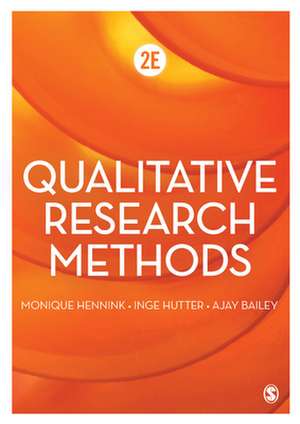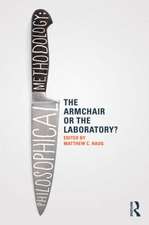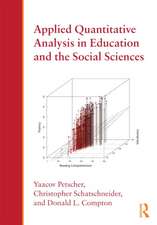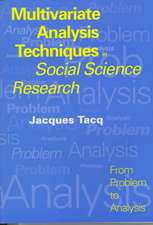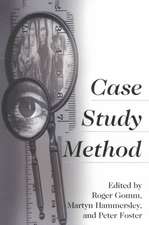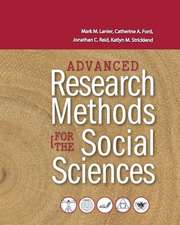Qualitative Research Methods
Autor Monique Hennink, Inge Hutter, Ajay Baileyen Limba Engleză Paperback – 22 ian 2020
Drawing on decades of experience teaching workshops, the book is packed with techniques and tools to help you turn theory and method into research practice. This second edition:
- Showcases the importance of linking research design to data analysis, helping you avoid potential pitfalls and get the most out of your data
- Highlights the relevance and wide application of qualitative methods with an array of international examples of real field research and interdisciplinary case studies
- Gives clear guidance on writing qualitative research, including how to respond to critiques of qualitative methods
- Has a renewed focus on evaluating quality in qualitative research, ensuring your work is valid, reflexive and ethical
| Toate formatele și edițiile | Preț | Express |
|---|---|---|
| Paperback (1) | 387.35 lei 3-5 săpt. | +34.15 lei 6-10 zile |
| SAGE Publications – 22 ian 2020 | 387.35 lei 3-5 săpt. | +34.15 lei 6-10 zile |
| Hardback (1) | 959.08 lei 6-8 săpt. | |
| SAGE Publications – 22 ian 2020 | 959.08 lei 6-8 săpt. |
Preț: 387.35 lei
Nou
74.12€ • 80.76$ • 62.46£
Carte disponibilă
Livrare economică 02-16 aprilie
Livrare express 18-22 martie pentru 44.14 lei
Specificații
ISBN-10: 1473903912
Pagini: 376
Dimensiuni: 184 x 246 x 20 mm
Greutate: 0.66 kg
Ediția:Second Edition
Editura: SAGE Publications
Colecția Sage Publications Ltd
Locul publicării:London, United Kingdom
Recenzii
Hennink, Hutter and Bailey provide a highly practical overview of all stages in the qualitative research process, linking clearly the cycles of design, data collection and data analysis. Excellent case studies illustrate qualitative research in practice. The authors’ clarity and coherence throughout the text makes this book a valuable read for all qualitative researchers.
Written from a situated epistemological perspective, this handbook nicely blends theory with method and method with practical examples. A valuable guide for early career researchers in need of clear and simple answers to deal with complex phenomena and common critiques.
Cuprins
Who is this book for?
The qualitative research cycle
Structure of the book
Features of this book
Chapter 2: The nature of qualitative research
What is qualitative research?
When to conduct qualitative research
The underlying interpretive paradigm
Qualitative and quantitative research
Verstehen and understanding
The emic and etic perspectives
Subjectivity and the need for reflexivity
Our approach to qualitative research
Evaluating quality
Part I: The design cycle
Chapter 3: The design cycle
Formulating qualitative research questions
Incorporating literature and theory
Developing a conceptual framework
Selecting qualitative research methods
Evaluating quality
Chapter 4: Designing participatory research
Our participatory approach to qualitative research
The participatory design cycle
The participatory approach in data collection and analysis
Different roles of the researcher
Evaluating quality
Chapter 5: Ethical issues in qualitative research
What is ethics?
Ethics in qualitative research
Ethical issues in the design cycle
Ethical issues in the data collection cycle
Ethical issues in the analytic cycle
Evaluating quality
Part II: The data collection cycle
Chapter 6: Sampling and participant recruitment
What is purposive sampling?
Purposive sampling process?
Participant recruitment strategies
How many participants? The principle of saturation
Evaluating quality
Chapter 7: In-depth interviews
What is an in-depth interview?
When to use in-depth interviews
Purpose of an in-depth interview
The cyclical nature of data collection
Developing an interview guide
Preparing for data collection
Conducting the interview: skills of the interviewer
Strengths and limitations
Evaluating quality
Chapter 8: Focus group discussions
What is a focus group discussion?
When to use focus group discussions
The cyclical nature of data collection
Developing the discussion guide
Preparing for data collection
Conducting focus group discussions
Post-discussion information
Virtual focus groups
Strengths and limitations
Evaluating quality
Chapter 9: Observation
What is observation?
When to conduct observation
The cyclical nature of data collection
What to observe
Types of observation
Preparation and conducting an observation
Writing an observation
Strengths and limitations
Evaluating quality
Part III: The analytic cycle
Chapter 10: Data preparation and developing codes
Different approaches to textual data analysis
The nature of qualitative data analysis
Textual data preparation
Developing codes
Making a codebook
Coding data
Using software in qualitative analysis
Evaluating quality
Writing the manuscript or report
Chapter 11: Textual data analysis
After you write
Developing an analysis plan
Searching data
The cyclical process of analysis
Description
Comparison
Categorizing and conceptualizing
Theory development
Evaluating quality
Chapter 12: From analysis to participatory action
From analysis to participatory action
The overall participatory qualitative research cycle
The different roles of the researcher
Evaluating quality
Chapter 13: Academic writing of qualitative research
Writing qualitative research
Before you write
Writing a qualitative research article
After you write
Responding to critiques of qualitative research
Evaluating quality
Post Script: Assessing quality in the qualitative research cycle
Notă biografică
Dr. Monique Hennink is an associate professor of global health at Emory University. She has particular expertise in applying qualitative methods to public health research. She has authored five textbooks on qualitative research and developed the ¿QUAL-WORKS¿ training program for public health professionals. Her research focuses on behavioral aspects of public health issues by understanding the social, cultural, and contextual influences on behavior in order to develop effective health interventions. Her research focuses primarily on sexual and reproductive health, sanitation behavior, chronic disease management, women¿s empowerment, and microcredit. She conducts research in multiple study contexts throughout Africa, Asia, UK, and USA.
